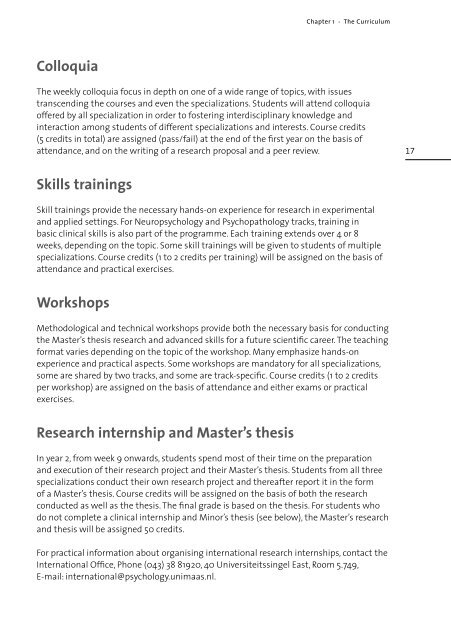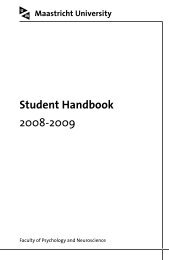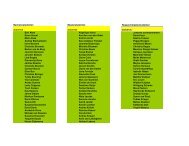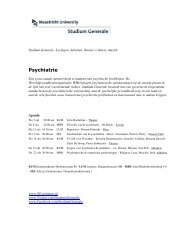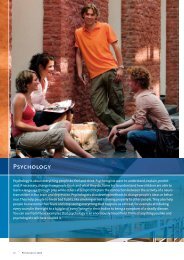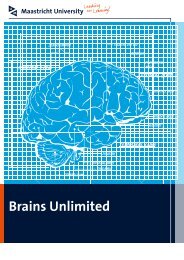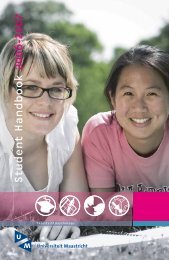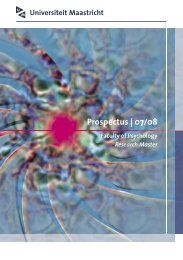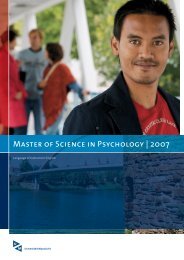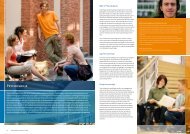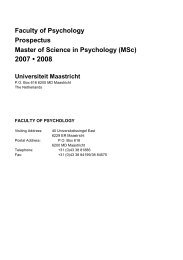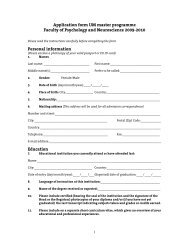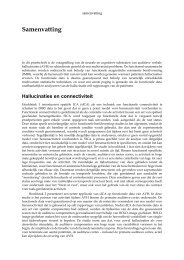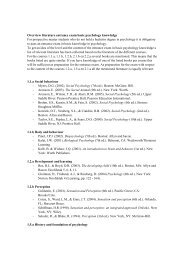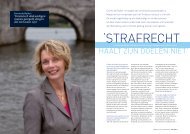Prospectus | 08/09 - Psychology and Neuroscience - Maastricht ...
Prospectus | 08/09 - Psychology and Neuroscience - Maastricht ...
Prospectus | 08/09 - Psychology and Neuroscience - Maastricht ...
You also want an ePaper? Increase the reach of your titles
YUMPU automatically turns print PDFs into web optimized ePapers that Google loves.
Chapter 1 - The Curriculum<br />
Colloquia<br />
The weekly colloquia focus in depth on one of a wide range of topics, with issues<br />
transcending the courses <strong>and</strong> even the specializations. Students will attend colloquia<br />
offered by all specialization in order to fostering interdisciplinary knowledge <strong>and</strong><br />
interaction among students of different specializations <strong>and</strong> interests. Course credits<br />
(5 credits in total) are assigned (pass/fail) at the end of the first year on the basis of<br />
attendance, <strong>and</strong> on the writing of a research proposal <strong>and</strong> a peer review.<br />
17<br />
Skills trainings<br />
Skill trainings provide the necessary h<strong>and</strong>s-on experience for research in experimental<br />
<strong>and</strong> applied settings. For Neuropsychology <strong>and</strong> Psychopathology tracks, training in<br />
basic clinical skills is also part of the programme. Each training extends over 4 or 8<br />
weeks, depending on the topic. Some skill trainings will be given to students of multiple<br />
specializations. Course credits (1 to 2 credits per training) will be assigned on the basis of<br />
attendance <strong>and</strong> practical exercises.<br />
Workshops<br />
Methodological <strong>and</strong> technical workshops provide both the necessary basis for conducting<br />
the Master’s thesis research <strong>and</strong> advanced skills for a future scientific career. The teaching<br />
format varies depending on the topic of the workshop. Many emphasize h<strong>and</strong>s-on<br />
experience <strong>and</strong> practical aspects. Some workshops are m<strong>and</strong>atory for all specializations,<br />
some are shared by two tracks, <strong>and</strong> some are track-specific. Course credits (1 to 2 credits<br />
per workshop) are assigned on the basis of attendance <strong>and</strong> either exams or practical<br />
exercises.<br />
Research internship <strong>and</strong> Master’s thesis<br />
In year 2, from week 9 onwards, students spend most of their time on the preparation<br />
<strong>and</strong> execution of their research project <strong>and</strong> their Master’s thesis. Students from all three<br />
specializations conduct their own research project <strong>and</strong> thereafter report it in the form<br />
of a Master’s thesis. Course credits will be assigned on the basis of both the research<br />
conducted as well as the thesis. The final grade is based on the thesis. For students who<br />
do not complete a clinical internship <strong>and</strong> Minor’s thesis (see below), the Master’s research<br />
<strong>and</strong> thesis will be assigned 50 credits.<br />
For practical information about organising international research internships, contact the<br />
International Office, Phone (043) 38 81920, 40 Universiteitssingel East, Room 5.749,<br />
E-mail: international@psychology.unimaas.nl.


